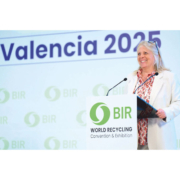BIR World Recycling Convention Week 2020 International Environment Council: Stakes Are High for Recyclers in Basel Convention’s Annex IV Review
The webinar hosted by the BIR International Environment Council (IEC) on October 15 demonstrated once again the breadth of issues constantly appearing on the world recycling association’s radar. In particular, “many authorities now think the export of waste should be stopped and do not think about the consequences of that,” noted IEC Chairman Olivier François of Galloo in his introductory comments. If waste exports were halted, he added, “it would be a big disaster for all our activities”.
It was in this context that BIR Trade & Environment Director Ross Bartley provided an update on the review of Annex IV of the United Nations Basel Convention governing transboundary movements of waste. Those engaged in this review process, he said, should be striving to create an amended Annex that was “future-proofed” but “undistorted”.
Through its direct involvement in these discussions, BIR was aiming to ensure that “all physical/mechanical, chemical and biological recovery operations by which waste materials are reprocessed into products, materials and substances, whether for the original or other purposes, are recognized as ‘recycling’,” he stated.
Among the specific issues commanding the attention of BIR is differentiation between interim and non-interim operations. “There could be a massive problem if the wrong judgements are made,” warned Mr Bartley. Using the example of the direct re-rolling of metal recovered from ship dismantling, he made the general point: “Most recycling is done mechanically.”
An urgent call for information from plastic recyclers was made by Mr Bartley because of the new Basel Convention plastic waste listings coming into force at the start of next year. Companies were asked to provide him with specifications and standards of plastic wastes that may explain phrases such as “almost free from contamination and other types of wastes” and “almost exclusively” of a particular polymer. Also, information on sampling methods was requested, as well as photos of plastic waste, including as collected: PE, PP, PS, ABS, PET, PC, polyethers, FEP, PFA, MFA, PVF and PVDF; resins; and mixtures of only PE, PP and PET.
The webinar also featured an update on the EU’s revision of its Waste Shipment Regulations, for which a new proposal is scheduled to emerge in the spring of 2021. Its three main objectives are to: streamline the functioning of the EU’s internal market; restrict exports of EU waste and guarantee any such shipments are managed in an environmentally sound manner; and to improve the prevention of illegal shipments of waste.
Julia Blees, Senior Policy Officer at the European Recycling Industries’ Confederation (EuRIC), argued that greater use of fast-track notifications would help towards achieving the first of these aims. There was also a need, she said, for regulations to distinguish between unprocessed and processed wastes, adding that access to global markets was “crucial” for the latter. She also called for a distinction to be made between shipment transgressions that were simply the result of an administrative error and “unlawful criminal offences committed intentionally or with serious negligence”.
Fellow guest speaker Jordi Costa, Technical Secretary at Gremi de Recuperació de Catalunya, outlined his organization’s development of a packaging recyclability certificate based on an evaluation of everything from residues in material arriving at processors’ installations and the availability of local collection services to the market value of the final recyclate. Under the scheme, packaging can be awarded a recyclability percentage and/or a star rating, with five stars representing recyclability above 85% and one star denoting 20-45%.
According to Mr Costa, the aim had been to devise a “reliable” and “robust” system in which consumers had confidence and in which packaging producers would wish to participate.
Source: BIR (Brussels, 20 October 2020)







